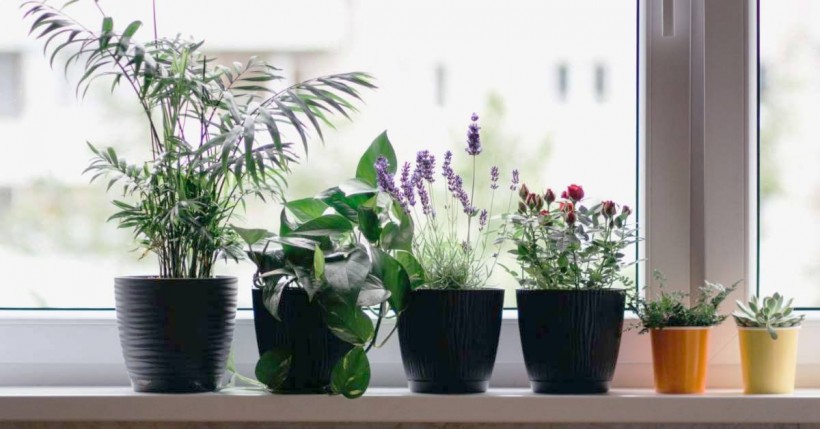Top 15 Bedroom Plants That Will Help You Sleep Better
Warning: Undefined variable $post in /home/dietofli/public_html/wp-content/plugins/code-snippets/php/snippet-ops.php(584) : eval()'d code on line 3
Warning: Attempt to read property "ID" on null in /home/dietofli/public_html/wp-content/plugins/code-snippets/php/snippet-ops.php(584) : eval()'d code on line 3
The estimated reading time is 10 minutes
Warning: Undefined variable $post in /home/dietofli/public_html/wp-content/plugins/oxygen/component-framework/components/classes/code-block.class.php(115) : eval()'d code on line 3
Warning: Attempt to read property "ID" on null in /home/dietofli/public_html/wp-content/plugins/oxygen/component-framework/components/classes/code-block.class.php(115) : eval()'d code on line 3

In addition to beautifying any space, indoor plants offer a variety of health benefits. Studies have shown that indoor plants may help lower stress levels as well as improve attention, concentration, and productivity. (1,2,3)
Moreover, a NASA study has found that the roots and soil of indoor plants can improve the quality of indoor air by reducing volatile organic chemicals, such as benzene, trichloroethylene, and formaldehyde. (4)
But, did you know that keeping indoor plants in your bedroom can help you get a good night’s sleep too?
Are you wondering how this is possible? Well, some plants, such as spider and aloe vera plants, purify the air from organic chemicals and help you breathe more easily because they release oxygen into the air. These plants are also effective in absorbing the carbon dioxide that you exhale while sleeping.
So, in this article, we’ll present the best indoor plants you should keep in your bedroom for better sleep. We’ll also explain what organic chemicals indoor plants purify the air from. Without further ado, let’s dive right into it.
Top 15 Bedroom Plants That Will Help You Sleep Better
1. Spider Plant (Chlorophytum comosum)
Spider plant is effective in purifying the air from carbon monoxide, benzene, xylene, and formaldehyde. It also absorbs fumes and odors and increases the amount of oxygen in the air. These properties make spider plants a great plant to keep in your bedroom for a sound sleep.
This plant should be kept in moderate to bright, indirect light and watered occasionally.
2. Aloe Vera (Aloe vera)
In addition to healing burns and scrapes when applied topically, aloe vera releases oxygen at night, which reduces organic pollutants in the air and helps you breathe more easily, which, in turn, allows you to get a good night’s sleep.
Aloe vera does not require a lot of care and it is best for purifying the air form formaldehyde and benzene.
3. Snake Plant (Sansevieria trifasciata)
Snake plant, also known as “mother-in-law’s tongue,” is an excellent air-purifying plant to be kept in the bedroom. Another great characteristic of this plant is its ability to convert carbon dioxide into oxygen at night, compared to most indoor plants that do this during the daytime.
In addition, snake plant doesn’t require a lot of care. It should be kept in bright, indirect light and occasionally watered.
4. Areca Palm (Dypsis lutescens)
This tropical plant beautifies any indoor space and makes it look exotic. Areca palm helps humidify the air, which is why it’s great for people who have sinus problems. Additionally, areca palm purifies the air from organic chemicals, such as trichloroethylene, formaldehyde, and benzene. Moreover, one study has shown that this plant is effective in reducing carbon dioxide. (5)
Areca palm requires bright, indirect light and moist soil. It also needs space so as to spread out.
5. Peace Lily (Spathiphyllum)
Besides having wonderful white flowers, the peace lily is effective in purifying the air from trichloroethylene, benzene, alcohols, formaldehyde, and acetone. This plant has also been shown to have the ability to reduce carbon dioxide.
The Peace lily grows best in moderate to bright, indirect light and it should be watered regularly.
We need to note here that this plant is poisonous, so if you keep it in your home, make sure it’s out of reach of children and pets.
6. Chamomile (Matricaria chamomilla)
Many people report that keeping chamomile in the bedroom contributes to a sound and restful sleep.
One study has suggested that chamomile induces sleep and that in the form of an aqueous extract, it has been used to treat sleep problems, like insomnia and nightmares, in traditional medicine. (6)
We advise you to keep this herb close to your bed so that you can inhale its fresh, relaxing aroma while sleeping.
7. Bamboo Palm (Chamaedorea seifrizii)
This plant makes any space look clean and warm. It also reduces organic chemicals, such as trichloroethylene and benzene in the air. It requires bright, direct light and enough space to spread out.
8. Chinese Evergreen (Aglaonema)
This plant is known for its vivid and glossy leaves. It’s one of the best plants to keep in the bedroom since it purifies the air from organic pollutants.
Chinese evergreen is easy to grow. It requires medium to low indirect light. It prefers high humidity and needs to be watered at least once a week. And while it can tolerate dry air and poor light, it should be kept away from drafts and cold conditions.
9. Gerbera Daisy (Gerbera jamesonii)
If you want to add décor to your bedroom, then gerbera daisy is ideal for you. Many people love this plant for its beautiful, sweet scent and creamy-white flowers.
Gerbera daisy purifies the air from organic pollutants and increases the amount of oxygen in the air. Keeping this plant in the bedroom means that you’ll be able to breathe clean, fresh air while sleeping at night.
Gerbera daisies require full direct sunlight and they should be watered in the morning once a week.
10. Bromeliad (Bromeliaceae)
If you’re looking for a good air-purifying plant to keep in your bedroom, the bromeliad is an excellent option. Not only does this plant purifies the air, it is also effective in absorbing carbon dioxide in the daytime and releasing oxygen at night. Keeping this tropical plant in your bedroom is a good way to ensure that you’ll have a good night’s sleep while breathing clean air.
Bromeliads grow best in bright, indirect light and require optimal humidity.
11. English Ivy (Hedera helix)
It’s no wonder that English ivy is on the list of the best air-purifying plants since it’s effective in absorbing benzene, toluene, formaldehyde, and xylene. In addition, one study has suggested that this plant may be effective in treating cough and respiratory tract infections. (7)
Another study has indicated that English ivy can improve the respiratory functions of children that have asthma. (8)
This plant grows best in bright light in fall and winter and it requires moderate light in spring and summer. It should be watered regularly too.
If you have children or pets, ensure that you place it out of their reach since if it’s ingested, it can be toxic.
12. Jasmine (Jasminum)
This delicate plant is widely known for its beautiful blossoms as well as its sweet and tropical smell. It’s commonly found in candles and perfumes. So, if you want to breathe in fresh, pleasant-smelling air while sleeping, jasmine is the right choice for you.
This plant requires moist soil in summer and it should be kept slightly dry in the fall, winter, and spring months. It also grows best in bright, direct light.
13. Gardenia (Gardenia jasminoides)
Gardenia is a great plant to keep in the bedroom for a restful sleep. One study has found that crocetin, a compound found in gardenia, can improve the quality of sleep. (9)
So, instead of taking a sleeping pill when struggling with insomnia, pick up this plant for your room and let its fresh, fragrant scent relax your body and help you fall asleep more easily.
Gardenia requires bright, indirect light and moist soil.
14. Orchid (Orchidaceae)
Not only is this tropical flower effective in absorbing carbon dioxide, it also releases oxygen at night. So, to breathe easily and get a good night’s sleep, keep this flower close to your bed.
Orchids require bright, indirect light. They also require a different potting soil than what most other plants do as they grow on the surface of rocks, trees, and other plants.
15. Lavender (Lavandula)
Lavender is commonly used in essential oil diffusers as it helps induce better sleep and create a relaxing atmosphere.
One study has proven the relaxing properties of this plant. The study found that lavender bath oil improved sleep as well as reduced crying and stress in young infants. Moreover, the lavender bath oil had a relaxing effect on the infants’ mothers as well. (10)
Additionally, another study has indicated that lavender can promote deep sleep in young women and men. (11)
This plant requires bright, direct light for a couple of hours a day and it should be watered when the soil gets slightly dry.
What Volatile Organic Compounds Do Indoor Plants Purify The Air From?
- Benzene: It is found in many items, such as gasoline, rubber, inks, plastics, oils, dyes, explosives, pharmaceuticals, and detergents. Chronic exposure to this compound can cause nervousness, loss of appetite, drowsiness, headaches, and even bone marrow disease and anaemia.
- Trichloroethylene: It is present in items, such as paints, adhesives, varnishes, inks, and lacquers as well are in the dry-cleaning industries. This compound is considered as a powerful liver carcinogen.
- Formaldehyde: It is found in items, such as cleaning agents, grocery bags, paper towels, and facial tissues. It’s also present in cigarette smoke, kerosene, and natural gas. Exposure to this chemical can cause headaches, asthma, as well as irritation of the eyes and upper respiratory tract (4).
- Ammonia: It’s often found in fertilizers, floor wax, and household cleaners.
- Xylene: It’s present in rubber, tobacco smoke, and paint.
Frequently Asked Questions
Should I Keep Plants In The Bedroom?
In spite of the various benefits that indoor plants offer, opinions are mixed when it comes to keeping them in the bedroom. Some people believe that this is not a good idea since plants may release carbon dioxide into the air. However, people, as well as pets, release more carbon dioxide than plants do. In addition, CO2 in small amounts can’t harm your health. So, the answer to this question is yes.
What Plants Should I Keep In The Bedroom?
This question has several answers. If you’re looking for a bedroom plant that releases oxygen, go for the spider plant, aloe vera, or gerbera daisy. If you’re looking for a bedroom plant that reduces carbon dioxide, go for the snake plant, areca palm, peace lily, bromeliad, or orchid. If you’re looking for a bedroom plant that can help you fall asleep more easily, go for chamomile, gardenia, or lavender. Or if you’re looking for a bedroom plant that purifies the air, go for the areca palm, spider plant, snake plant, peace lily, bamboo palm, or English ivy.
Which Plants Can Help You Sleep Better?
Plants that are effective in inducing sleep include:
- gardenia
- lavender
- chamomile
- spider plant
- aloe vera
- orchid
Which Bedroom Plant Releases More Oxygen At Night?
Bedroom plants that emit oxygen at night include:
- Spider plant
- Aloe vera
- Snake plant (it converts carbon dioxide into oxygen)
- Gerbera daisy
- Bromeliad
- Orchid
Conclusion
- In addition to making any space look more beautiful, indoor plants offer various health benefits. Studies have shown that indoor plants may help improve productivity, attention, and concentration, lower stress levels as well as purify the air from organic chemicals.
- Keeping spider plants is good for a sound sleep. Other plants that can help you fall asleep more easily and have a restful sleep include chamomile, gardenia, and lavender.
- The best bedroom plants that release oxygen include spider plants, gerbera daisy, snake plants, bromeliad, aloe vera, and orchids.
- Best air-purifying bedroom plants include areca plant, bamboo palm, snake plant, English ivy, and peace lily.
- Other great plants that you should keep in your bedroom include Chinese evergreen, bromeliad, jasmine, and orchid.
- Indoor plants purify the air from organic chemicals, such as benzene, trichloroethylene, formaldehyde, ammonia, and xylene.
- Keeping plants in the bedroom is generally safe.














